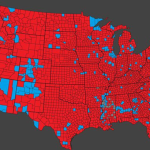The Supreme Court issued a report Thursday on the leak last May of a draft decision in the Dobbs case overturning the Roe and Casey abortion rulings thereby returning the issue of abortion to the states. The report says the leaker could not be found and that new protocols for drafts have been put in place. Ninety-seven Court staffers were interviewed and all denied they were the leaker. They all signed sworn affidavits under penalty of perjury denying being the leaker. The Court says the investigation remains open. The report states a hack of the Court’s computer system was “unlikely.”
SUPREME COURT OF THE UNITED STATES
STATEMENT OF THE COURT CONCERNING THE LEAK INVESTIGATION
In May 2022, this Court suffered one of the worst breaches of trust in its history: the leak of a draft opinion. The leak was no mere misguided attempt at protest. It was a grave assault on the judicial process. To meet our obligations as judges, we accept submissions from parties and amici, we engage advocates at oral argument, and we publish explanations of our final decisions. All of this we do in the open. Along the way, though, it is essential that we deliberate with one another candidly and in confidence. That phase of the judicial process affords us an opportunity to hone initial thoughts, reconsider views, persuade one another, and work collaboratively to strengthen our collective judgment. It is no exaggeration to say that the integrity of judicial proceedings depends on the inviolability of internal deliberations.
For these reasons and others, the Court immediately and unanimously agreed that the extraordinary betrayal of trust that took place last May warranted a thorough investigation. The Chief Justice assigned the task to the Marshal of the Supreme Court and her staff. After months of diligent analysis of forensic evidence and interviews of almost 100 employees, the Marshal’s team determined that no further investigation was warranted with respect to many of the “82 employees [who] had access to electronic or hard copies of the draft opinion.” Marshal’s Report of Findings & Recommendations 11 (Jan. 19, 2023). In following up on all available leads, however, the Marshal’s team performed additional forensic analysis and conducted multiple follow-up interviews of certain employees. But the team has to date been unable to identify a person responsible by a preponderance of the evidence. Id., at 17. A public version of the Marshal’s report is attached.
Recently, this Court consulted Michael Chertoff. Mr. Chertoff is a former Secretary of Homeland Security, Judge of the U. S. Court of Appeals for the Third Circuit, Assistant Attorney General for the Criminal Division of the U. S. Department of Justice, and U. S. Attorney for the District of New Jersey. We invited Mr. Chertoff to assess the Marshal’s investigation. He has advised that the Marshal “undertook a thorough investigation” and, “[a]t this time, I cannot identify any additional useful investigative measures” not already undertaken or underway. Statement from Michael Chertoff 1 (2023). A copy of Mr. Chertoff’s statement is attached.
The Marshal reports that “[i]nvestigators continue to review and process some electronic data that has been collected and a few other inquiries remain pending.” Marshal’s Report 2. “To the extent that additional investigation yields new evidence or leads, the investigators will pursue them.” Ibid. The Marshal and her team will continue to have our full support.
JANUARY 19, 2023
Link to Court statement and reports by Chertoff and the Marshal.
Excerpts from the Marshal’s report:
On May 2, 2022, Politico published a copy of the draft majority opinion in Dobbs v. Jackson Women’s Health Org., No. 19-1392. On May 3, 2022, the Chief Justice publicly announced that he had directed the Marshal to launch an investigation into the public disclosure of the draft majority opinion. On May 5, 2022, the Marshal initiated an investigation to determine who made the unauthorized disclosure of the draft majority opinion. The Marshal, in consultation with close advisors at the Court, developed an investigative plan of action. Investigators followed that plan, documented the course of their investigation, and reported the results. Section II of this report captures the material findings and recommendations. The investigative team consists of seasoned attorneys and trained federal investigators with substantial experience conducting criminal, administrative and cyber investigations.
The investigation has determined that it is unlikely that the Court’s information technology (IT) systems were improperly accessed by a person outside the Court. After examining the Court’s computer devices, networks, printers, and available call and text logs, investigators have found no forensic evidence indicating who disclosed the draft opinion. They have conducted 126 formal interviews of 97 employees, all of whom denied disclosing the opinion. Despite these efforts, investigators have been unable to determine at this time, using a preponderance of the evidence standard, the identity of the person(s) who disclosed the draft majority opinion in Dobbs v. Jackson Women’s Health Org. or how the draft opinion was provided to Politico. Investigators continue to review and process some electronic data that has been collected and a few other inquiries remain pending. To the extent that additional investigation yields new evidence or leads, the investigators will pursue them.
If a Court employee disclosed the draft opinion, that person brazenly violated a system that was built fundamentally on trust with limited safeguards to regulate and constrain access to very sensitive information. The pandemic and resulting expansion of the ability to work from home, as well as gaps in the Court’s security policies, created an environment where it was too easy to remove sensitive information from the building and the Court’s IT networks, increasing the risk of both deliberate and accidental disclosures of Court-sensitive information. The investigation has identified numerous Court policies and practices that should be improved, some of which are set forth in Section II
of this report and are being implemented. A more detailed set of recommendations is included as Annex A to the report; Annex A is not being
released to the public because doing so could unwisely expose Court operations and information to potential bad actors. The Justices, assisted by the Court Officers, will need to assess whether to adopt some or all of the more detailed recommendations.
More:
At the conclusion of the initial interviews, each employee was asked to sign an affidavit, under penalty of perjury, affirming that he or she did not disclose the Dobbs draft opinion to any person not employed by the Supreme Court, did not disclose to any person not employed by the Supreme Court any information relating to the Dobbs draft opinion not made public through means authorized by the Court, and had provided all of the pertinent information known to him or her relating to the disclosure or publication of the Dobbs draft opinion. Each employee was then asked to swear to the truth of the statements in the affidavit before a Notary Public. Each of these employees
signed a sworn affidavit. A few of those interviewed admitted to telling their spouses about the draft opinion or vote count, so they annotated their affidavits to that effect. If investigators later determine any personnel lied to the investigators, those personnel would be subject to prosecution for a false statement in violation of 18 USC § 1001.
…Investigators looked closely into any connections between employees and reporters. They especially scrutinized any contacts with anyone associated with Politico. Investigators also assessed the wide array of public speculation, mostly on social media, about any individual who may have disclosed the document. Several law clerks were named in various posts. In their inquiries, the investigators found nothing to substantiate any of the social media allegations regarding the disclosure.
More:
At this time, based on a preponderance of the evidence standard, it is not possible to determine the identity of any individual who may have disclosed the document or how the draft opinion ended up with Politico. No one confessed to publicly disclosing the document and none of the available forensic and other evidence provided a basis for identifying any individual as the source of the document. While investigators and the Court’s IT experts cannot absolutely rule out a hack, the evidence to date reveals no suggestion of improper outside
access. Investigators also cannot eliminate the possibility that the draft opinion was inadvertently or negligently disclosed – for example, by being left in a public space either inside or outside the building.
Assuming, however, that the opinion was intentionally provided to Politico by a Court employee, that individual was evidently able to act without being detected by any of the Court’s IT systems. If it was a Court employee, or someone who had access to an employee’s home, that person was able to act with impunity because of inadequate security with respect to the movement of hard copy documents from the Court to home, the absence of mechanisms to track print jobs on Court printers and copiers, and other gaps in security or policies.
The post Supreme Court Cannot Find Leaker of Abortion Draft Ruling, Issues Report appeared first on The Gateway Pundit.







